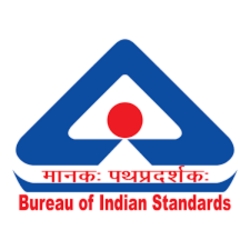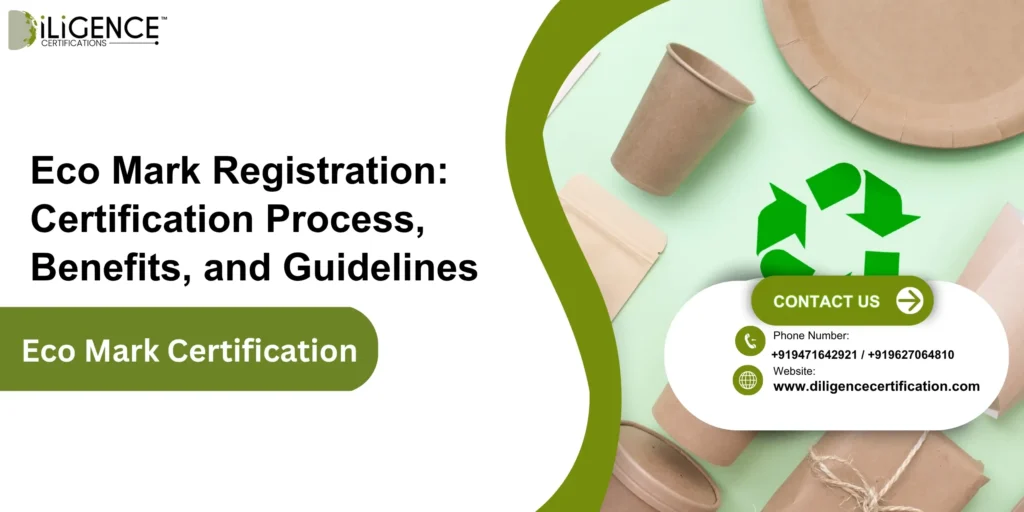- ECO Mark Registration is an acknowledgment for the eco-friendly products in India and thus, it is a positive factor for brand credibility and a wider market reach.
- Ecomark guarantees that the products are up to the Bureau of Indian Standards (BIS) environmental norms no matter which category they belong to.
- The registration allows the companies to be noticed in the green market that is getting bigger and bigger, thus giving them a chance to satisfy the consumers who are looking for sustainable and responsible products.
- Certification is a major part of the process that motivates a company to keep on innovating in eco-friendly ways and to adopt sustainable production practices which in turn, reflects the company’s commitment to being environmentally responsible.
Introduction

Sustainability is no longer optional; it has become a key factor in consumer decision making and brand reputation in today’s global market. Producers of sustainable products want consumers, regulators, and corporate clients to trust their claims of product sustainability. ECO Mark Registration provides assurance through third-party certification that sustainable products are produced in accordance with rigorous environmental standards established by the Bureau of Indian Standards (BIS).
The certification provides a level of assurance regarding sustainability, and it can provide greater market acceptance, and improved compliance with environmental standards locally and abroad. Certification ultimately allows a brand to support and lead responsibly in its sector. The process is simplified with the help of Diligence Certifications, allowing manufacturers and service providers to easily illustrate true dedication to sustainability and operational excellence providers demonstrate genuine commitment to sustainability and operational excellence.
What is ECO Mark Registration?

ECO Mark Registration is an official certification assigned by the Bureau of Indian Standards (BIS) to products that meet defined environmental standards. The intent is to facilitate the manufacture and usage of products that are eco-friendly and minimize environmental impact during their use, and in their disposal.
Key Highlights:
- Official certification from BIS provides genuine credibility to products.
- Concerns a large range of products, including personal care, electrical goods, textiles, and packaged goods.
- Allows consumers to identify environmentally responsible products and support them as an alternative to products that have a negative impact on [environment].
What Does the Eco Mark Logo Represent?
The Eco Mark symbol displays a matka (earthen pot) — a representation of pureness and simplicity that does not disturb the balance of the environment in its use. The pot represents the earth and provides a meaning consistent with Indian tradition and reverence for nature.
Manufacturers using the Eco Mark symbol are demonstrating that:
- They are compliant with India’s environmental standards,
- They are lower carbon producing products, and
- They are safe for humans and the environment.
Who Grants the Eco Mark Certification?
The Bureau of Indian Standards (BIS) provides the Eco Mark certification through the Ministry of Environment, Forest and Climate Change (MoEFCC).
BIS ensures compliance with the relevant quality standards. The Central Pollution Control Board (CPCB) evaluates the environmental criteria. Together, the two organizations make a determination on approval for use of the Eco Mark logo.
Objective of the Eco Mark
The Indian Government developed the Eco Mark Scheme with the explicit purposes of encouraging sustainable production, responsible consumption, and awareness of the damage to the environment. Eco Mark is more than an ordinary certification; it assesses not only the product’s quality but also the ecological aspects of production and consumption.
Primary Objectives
Promote Eco-Friendly Products
The core objective is to identify, label, and advocate for products that are safe for the environment, produced by sustainable practices, and engage in the reduction of pollution. With the Eco Mark, the government is prompting the manufacturers to be environmentally-sensitive in the extraction of raw materials, production, and packaging of products.
2. Encourage Sustainable Manufacturing Processes
Eco Mark provides certification that encourages industries to adopt resource-efficient and low-waste manufacturing processes. These practices consist of emission-control, water conservation, and/or the use of biodegradable or recyclable materials. The companies that engage in these practices are able to shrink their respective carbon footprint and be responsible.
3. Educate Consumer
An important goal is consumer awareness. The Eco Mark logo is a reliable identifier that consumers can use to recognize eco-friendly products. In this way, it enables consumers to make their buying decision stewardships toward sustainable development.
4. Standardize Environmental Quality of Products
Eco Mark, through the regulations established by BIS and the guidelines set by CPCB, sets an environmental quality standard. Products that carry the Eco Mark have undergone testing and have met the rigorous testing requirements, ensuring the product meets safety and eco-efficiency in its design, as relevant.
5. Assist with Green Branding and Market Advantage
The Eco Mark Scheme, by marketing eco-certified products, enables companies to differentiate themselves from other products in the market. Eco Mark certified products gain greater acceptance by concerned consumers, and become a competitive advantage.
6. Contribute to National Environmental Goals
The scheme also aligns with the overall national environmental goals such as reducing industrial pollution, reducing green consumption and meeting objectives, and contributing to climate actions. The Eco Mark Certification will serves to provide incentive for industries to utilize green technologies to facilitate national goals.
Importance of Ecomark for Businesses
Ecomark Certification holds significance beyond regulations as it is an advantage to adhere to for businesses in India:
- Consumers Trust: Indian consumers are more environment-friendly-conscious than before. As Nielsen states, 73% of urban consumers are looking for sustainable products.
- Differentiation within the Market: When competing products in the FMCG, textiles, or electronics space, Ecomark-certified businesses will differentiate their product from competitors in the market.
- Compliance and Exporting: With international markets discussing ECO Mark as evidence of environmentally-designated manufacturing, Ecomark will assist with compliance for your exports or ease of exports.
Eligibility Criteria for ECO Mark Registration
Eligibility depends on product category and follows the rules below:
- Compliance with appropriate BIS environmental standards.
- Use of environmentally safe raw materials and sustainable production methods.
- Evidence of emissions reductions, energy efficiency, and proper waste management.
- Lifecycle assessment demonstrating environmental benefits.
Categories Covered Under Ecomark
Ecomark covers a wide selection of products, providing industry-wide coverage in the following areas:
- Textiles – Use of organic textiles, non-toxic dye, low use of water in production.
- Paper Products – Recycled paper, paper goods and packaging that meet eco-friendly standards, and use of Forest Stewardship Council guidelines.
- Detergents & Soaps – Biodegradable, phosphate-free, low-toxicity detergents and soaps.
- Cosmetics & Personal Care – Use of natural ingredients and no toxic chemicals.
- Electronics and Appliances – Energy-efficient appliances with a low carbon footprint.
- Food Products – Environmentally sustainable ways of growing, processing and distributing food products.
- Building Materials – Sustainable building materials that lessen environmental impact.
Required Documents for Eco Mark Registration
| S. No. | Document Name | Description / Purpose |
| 1 | Application Form | Official Eco Mark application submitted to the authority |
| 2 | Product Details | Detailed description of the product, usage, and specifications |
| 3 | Eco-friendly Claims / Declaration | Statement of environmental benefits and compliance with Eco Mark standards |
| 4 | Manufacturing Process | Description or flowchart of production highlighting eco-friendly steps |
| 5 | Test Reports / Certificates | Laboratory tests or certifications verifying environmental compliance |
| 6 | Fees Payment Proof | Proof of application fee payment |
Difference Between Eco Mark and Other Environmental Certifications
| Feature | Eco Mark | ISO 14001 | Energy Star | Ecomark (Non-Official) |
| Type | Government eco-label | Environmental management system | Energy efficiency label | Informal branding term |
| Issued By | BIS (India) | ISO (International) | U.S. EPA | Non-regulated |
| Focus | Product-level eco performance | Organizational sustainability | Appliance energy use | Generic sustainability |
| Logo | Matka symbol | ISO text logo | Blue Energy Star | Varies |
Step-by-Step ECO Mark Registration Process
The process of receiving Ecomark certification consists of several steps to verify compliance:
- Applying – Fill out the application in BIS’s portal and return to the BIS with product details and related manufacturing information.
- Document Verification – BIS evaluates the technical documentation, environmental data, and documentation related to the manufacturing process.
- Product Testing – A sample of the product is sent to an independently laboratory approved by BIS to determine if the product meets BIS’s standards related to environmental and sustainability outcomes.
- Factory Inspection – A BIS inspector is dispatched to the manufacturer’s facility to assess the production practices, quality of environmental management, and any measures of sustainability.
- Issuing the certification – After all documentation, tests, and inspections are verified, the ECO Mark certificate will be issued.
- Post-certification monitoring – For ongoing certifications, periodic audits can occur to ensure compliance with environmental or other standards for certification.
Function of the Eco Mark License
The Eco Mark License is more than just a permission to use a logo; it is an official endorsement of environmental legitimacy for a product. The Bureau of Indian Standards (BIS) issues the Eco Mark License which assures that certified products comply with environmental and quality standards, allowing businesses to operate in a responsible manner, and helps build confidence in consumers.
1. Legal Authorization to Display the Eco Mark Logo
A central function of the Eco Mark License is to permit manufacturers’ the right to use the Eco Mark logo on the packaging and/or marketing materials for their product. It is violation of the law to use the logo without a license, and there are penalties and/or fines that could be associated with unauthorized use of the logo.
Implication for businesses:
- Licensed products are the only ones that are authorized to claim they are eco-friendly, in accordance with the BIS regulations.
- The Eco Mark License protects manufacturers from misrepresentation and ill use of the Eco Mark logo in the marketplace.
2. Certification of Environmental Compliance
The Eco Mark License serves as a certificate of compliance, issued certifying that the eco-friendly product has been tested and verified based on BIS and CPCB environmental criteria.
- Current assurance that the product is free of harmful pollutants.
- Current assurance that manufacturer has adhered to sustainable production practices/guidelines.
- Providing evidence to regulators and/or stakeholders that any participating manufacturer conforms and meets eco-friendly requirements.
3. Customer Assurance and Market Credibility.
The Eco Mark License serves a bonding function for consumers. A licensed product means you can trust that:
- The product is safe for the environment,
- The product has low carbon and chemical effects, and
- The company is operating sustainably.
Effects on Business:
- Improves customer confidence in green brands.
- Improves brand reputation in physical and online retails
4. Market Access and Differentiation.
The license serves enablement to the market, providing licensed products a competitive advantage:
- It is preferred by retailers and distributors for green categories.
- It helps Indian manufacturers compete in international marketplaces that require eco-certification.
- It provides for easy distinction from competitive products that do not have an eco-label.
5. Regulatory Compliance and Risk Management.
The Eco Mark License serves a risk mitigation function:
- It assures manufacturers are compliant with India’s environmental regulations.
- It reduces the risk of litigation, penalties, and product recalls.
- It can synergize with corporate sustainability policies and CSR initiatives.
Renewal and Ongoing Monitoring
Licensing also serves as a basis for maintaining compliance, through recurring audits and renewal. This monitoring guarantees that the product remains compliant with established environmental guidelines, and ideally, promotes continual improvement in processes that ultimately lead to production.
Costs Associated with Ecomark Registration
Costs vary by product type, production scale, and testing requirements. Typical cost components include:
| Cost Component | Description |
| Application Fee | Submission and processing fee to BIS |
| Laboratory Testing Fee | Product sample testing and analysis |
| Inspection Fee | Factory and environmental audit costs |
| Certification Fee | Issuance of ECO Mark certificate |
| Renewal Fee | Recertification every five years |
Validity and Renewal
ECO Mark Registration is valid for five years from issuance. Renewal is essential to maintain certification:
- Submit renewal application at least six months before expiry.
- Provide updated environmental compliance data.
- Undergo sample testing and audit as required by BIS.
- Receive renewed certification upon successful compliance verification.
Benefits of Ecomark Registration
Market Benefits
- Establishes credibility with consumers through evidence of environmentally-friendly claims.
- Differentiates products in a crowded marketplace.
- Assists with green marketing initiatives.
Compliance with Regulatory Standards
- Gives assurance of meeting in-country environmental performance standards.
- Minimizes the possibility of penalties and/or reputation damage as a result of non-compliance.
International Trade
- Assists with exports to countries with strict compliance processes.
- Provides relevant documentation of green product standards that may be required for global tenders.
Operational Efficiencies
- Leads to more efficient resource consumption and reduced environmental impact.
- Leads to waste management and energy savings.
Role of Diligence Certifications
Diligence Certifications provides tailored support for ECO Mark Registration:
- End-to-End Application Support – Provides help with documentation, submission, and coordination.
- Audit and Inspection Ready – Prepares your factory and product for BIS evaluation.
- Technical Advice – Advises on compliance with BIS environmental standards and lifecycle assessment.
- After Certification Support – Assures compliance, renewals, and surveillance audits.
By partnering with the experts you can reduce processing time and improve chances of success.
Best Practices for ECO Mark Certification
- Implement internal environmental audits as a prerequisite to applying for sustainability certification.
- Incorporate sustainable raw materials and sustainable production methods wherever possible.
- Maintain thorough documentation of all environmental claims.
- Train staff on environmentally responsible practices and compliance.
- Work with certified labs to pre-test products identified as having gaps.
Conclusion
ECO Mark Registration is vital for organizations that are serious about sustainability and environmental stewardship. It provides credibility to claims of doing good for the environment, builds your reputation in the marketplace, and creates more opportunities locally and globally. When working with Diligence Certifications, you can be confident that your process will be simple, accurate, and ongoing.
You can get ECO Mark Registration today, in support of your sustainability story and consumer trust.
Frequently Asked Questions
What is ECO Mark Registration?
ECO Mark is a certification issued by the Bureau of Indian Standards (BIS) which applies to products that conform to specific environmental criteria in India.
What products can qualify for Ecomark?
Examples of qualified products are textiles, paper, detergents, cosmetics, electronics, food, and construction materials.
How long is the ECO Mark valid?
The certification will be valid for a five-year period from issuance.
Is it possible to renew the ECO Mark?
Certainly. The renewal process requires resubmission of testing reports, audits, and compliance evaluation.
Is ECO Mark mandatory to sell eco-friendly products?
No, it is not mandatory but can lend credibility, assurance and market presence.
Who issues Ecomark?
ECO Mark is issued by the Bureau of Indian Standards (BIS).
Does ECO Mark support market entry into international countries?
Yes, compliance certification helps with the export of products to those countries that are environmentally conscious.
How long does it take to go through the certification process?
The process typically takes 3 - 6 months based on testing, documentation standards and audits.
Can I certify multiple products at the same time?
It depends on the products. However, each product usually needs to be evaluated separately even if submitted at the same time, some categories (similar products) may allow for batch submissions.
How does Diligence Certifications help?
Diligence Certifications provides end-to-end support of the ECO Mark process covering the application process, documentation, testing, audit and renewed certification.








 BIS Certification
BIS Certification
 CDSCO
CDSCO
 CPCB
CPCB
 LMPC
LMPC
 WPC Approval
WPC Approval
 Global Approvals
Global Approvals
 TEC
TEC
 ARAI
ARAI
 BEE
BEE
 ISO Certification
ISO Certification
 DGCA Certification
DGCA Certification
 NOC For Steel
NOC For Steel



















 Business Registration
Business Registration















 Legal Services
Legal Services
 Trademark Registration
Trademark Registration
 Copyright Registration
Copyright Registration
 Patent Registration
Patent Registration















































